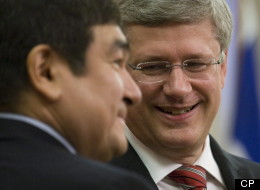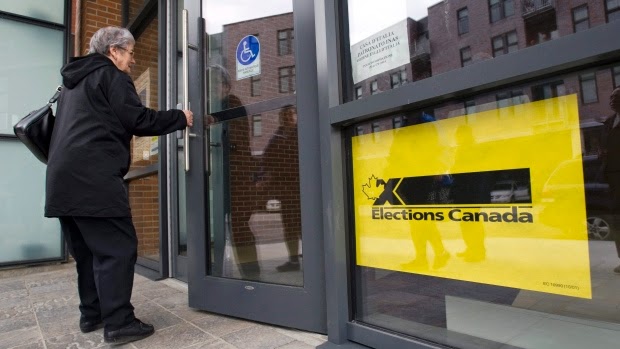
Ethics Commissioner won’t probe conflicts of interest in Penashue’s campaign
Ethics Commissioner Mary Dawson won’t probe potential conflicts of interest in Conservative candidate Peter Penashue’s campaign in Labrador after Green Party leader Elizabeth May launched a complaint. Penashue stepped down as Harper’s cabinet minister after acknowledging his campaign accepted illegal campaign donations in the 2011 election campaign. Meanwhile polling trends appear set to give Liberal candidate Yvonne Jones a landslide victory in the riding with over 60% of the popular vote.
Green Party leader Elizabeth May wants the ethics commissioner to look into complaints into how the by-election was called and how Harper’s actions before Penashue stepped down may serve as a conflict of interest. Activist group Democracy Watch launched a similar complaint.
May asked why Harper allowed Penashue to make a $1.4 million spending announcement in the riding four days before he resigned over illegal campaign donations. May also asked what motive was behind Harper’s decision to let Penashue run again in the riding before prosecutes decided on whether to press charges.
Dawson said May’s request didn’t set out reasonable grounds to how the actions broke the Conflict of Interests Act. Dawson also stated that actions to improve a candidate’s election prospects were not necessarily an advancement of private interests. Dawson also stated that despite being cabinet colleagues there wasn’t sufficient evidence to show they were friends as defined under the act.
If a candidate is undergoing an investigation over illegal campaign donations – that were acknowledged to – wouldn’t holding a by-election and allowing said candidate to run be a conflict of interest to the legitimacy of an electoral campaign? Isn’t allowing a candidate who’s set to resign to make a spending announcement a conflict of interest to the fairness of the electoral prospects of all the candidates who want to present themselves to the riding’s constituents? Isn’t the fact that Penashue is part of Harper’s cabinet and Harper needs every seat to maintain his majority in the House of Commons a demonstration that personal interests are being vetted by Harper’s endorsement of Penashue as “the best MP Labrador ever had?”
Nonetheless, despite seemingly suspicious and unfair actions from the Conservative party, the electoral prospects of Penashue’s opponents haven’t been diminished, in fact, Liberal candidate Yvonne Jones is set to win the seat with a landslide 60% of the vote. As far as May’s concerns go, while some of these claims can be disputed, a candidate who’s pending a criminal investigation after breaking the Elections Canada Act and using his status and the governing party to wage his campaign is unethical and puts to question said candidates legitimacy to run.
Nonetheless, Harper could have found a better candidate for Labrador and it is puzzling how a candidate who acknowledged his campaign broke the law is getting such an arousing endorsement by the “tough on crime” party. In fact, one would argue Harper’s advisers were out to lunch on that decision because endorsing a candidate who broke the law, regardless of political stripes, doesn’t bide down well in the present or future.
Do you think the ethics commissioner is wrong for dismissing May’s claims of potential conflict of interest in the Labrador By-election? Do you think these “advantages” have boosted his prospects as a result?




